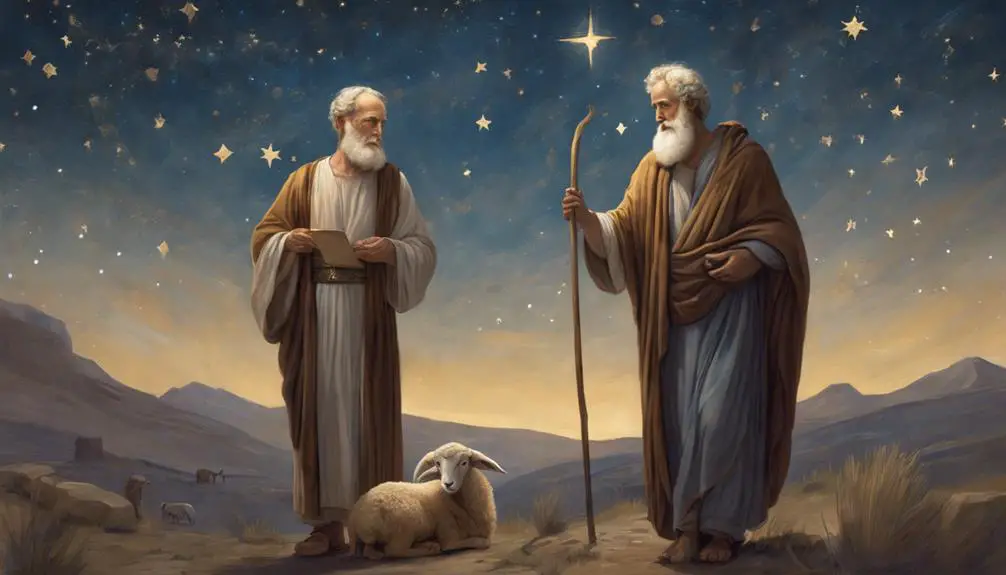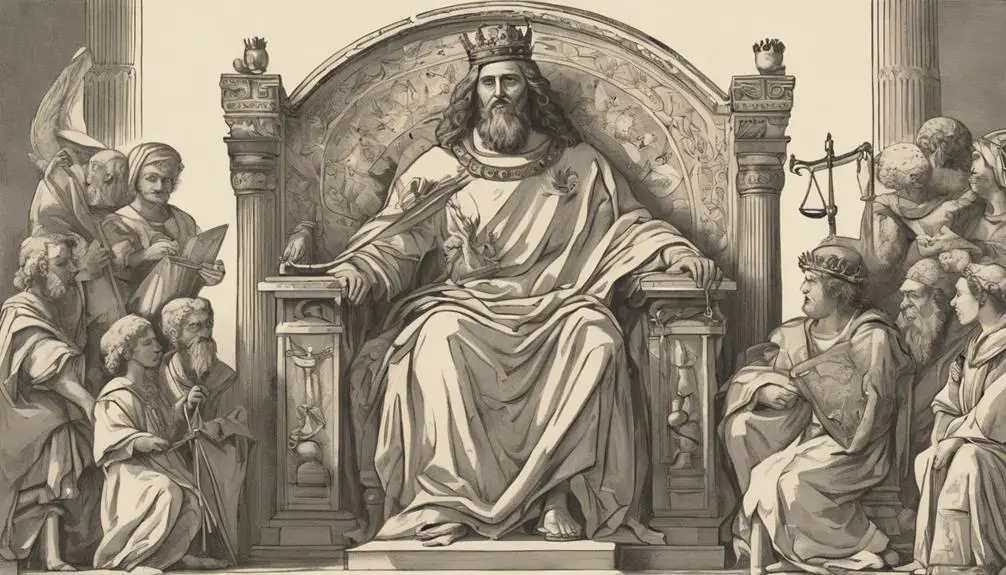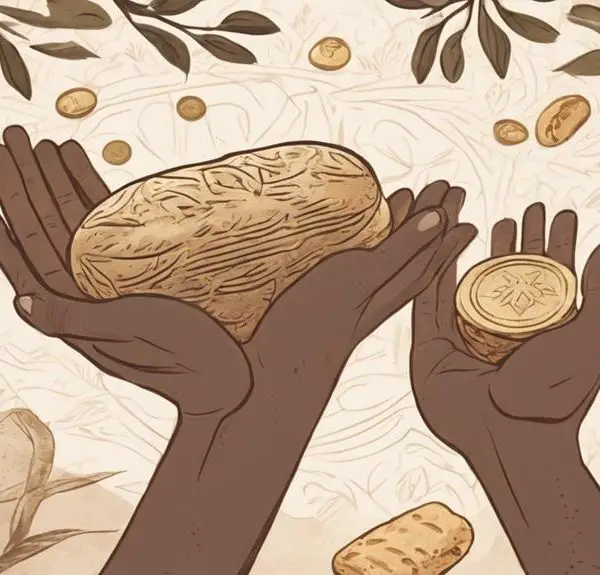Types of Fathers in the Bible reveal the complexity of fatherhood, from guidance to challenges; discover which resonates with you.

Types of Fathers in the Bible
Have you ever considered how the types of fathers depicted in the Bible mirror the complexities of fatherhood in our own lives?
From Abraham's patriarchal role to the unconditional love of the Prodigal's father, these figures offer a rich tapestry of guidance, wisdom, and sometimes, profound challenges.
Each biblical father brings to light different facets of what it means to guide, protect, and nurture. As we unpack their stories, you'll find that their experiences speak volumes about the enduring nature of fatherly love and leadership, leaving you pondering which type resonates most with your understanding of fatherhood.
Key Takeaways
- The Bible showcases diverse father figures, from Abraham's faith to Solomon's wisdom.
- Fathers in the Bible provide spiritual leadership, like Noah, and unconditional love, like the Prodigal's Father.
- Biblical fathers balance nurturing and protection, as seen with Joseph, alongside guiding their families with wisdom.
- These fathers highlight important virtues such as faith, forgiveness, wisdom, and nurturing care, setting examples across generations.
The Patriarchal Father: Abraham

As a foundational figure in the Abrahamic religions, Abraham embodies the quintessential patriarchal father, whose faith and actions set a precedent for subsequent generations. His narrative is marked by a series of covenant promises that underscore his pivotal role. At the heart of his story is Abraham's test, a profound demonstration of faith that not only defines his character but also sets a theological benchmark.
You'll find that Abraham's willingness to sacrifice his son Isaac, in response to God's command, is a cornerstone of Abrahamic faith. This act of obedience serves as a critical juncture, reinforcing the depth of his commitment and the extent of his trust in God's promises. It's through this lens that Abraham's role as a patriarchal father is most vividly illuminated.
The covenant promises made to Abraham are equally significant. They establish a perpetual bond between God and Abraham's descendants, promising them land, blessings, and a multitude of offspring. These promises not only underscore Abraham's pivotal role in the narrative but also highlight the enduring nature of his legacy. Through this covenant, Abraham's faithfulness shapes the spiritual lineage of countless generations, cementing his status as a paragon of patriarchal fatherhood.
The Righteous Father: Noah

Noah's narrative, a compelling testament to righteousness, positions him as a father figure whose unwavering faith and obedience amidst corruption set a standard for moral integrity and divine favor. Unlike his contemporaries, Noah epitomizes the righteous father through his actions and decisions, particularly in the context of the global flood—a divine response to humanity's pervasive wickedness. Noah's obedience to God's commands, despite the unprecedented nature of his task, underscores his steadfast faith and trust in divine wisdom.
Analyzing Noah's role further, you'll notice his actions extend beyond personal salvation; they embody a form of spiritual leadership for his family. By adhering to divine instructions without question, Noah not only ensures his family's physical survival but also secures their place in a covenant with God, marking a pivotal moment in biblical history. This aspect of Noah's story highlights the profound impact of a father's faith and obedience on his family's destiny.
In essence, Noah's narrative teaches you about the virtues of righteousness and obedience, especially in the face of adversity. His example serves as a beacon for fathers, urging them to lead with integrity and faith, ensuring their legacy positively influences future generations.
The Prodigal's Father: Luke 15

Shifting focus to the New Testament, we encounter another profound example of fatherhood in the parable of the Prodigal Son, where the father's unconditional love and forgiveness illuminate the depths of divine compassion and grace. This narrative vividly portrays a father's forgiving nature and his boundless capacity for unconditional love, setting a benchmark for divine forgiveness and parental love.
- Forgiving Nature: The father's readiness to forgive, even before his son formally apologizes, underscores an essential aspect of divine love. This illustrates the concept that forgiveness isn't contingent on the offender's actions but is a voluntary act of grace.
- Unconditional Love: The father's celebration upon his son's return, despite the son's squandering of his inheritance, exemplifies unparalleled love that transcends human flaws and errors.
- Eager Anticipation: The father's vigilant watch for his son's return highlights his enduring hope and love, emphasizing that true love patiently waits and eagerly anticipates reconciliation.
- Generosity in Forgiveness: The lavish welcome the father gives his returning son—bestowing him with a robe, ring, and a feast—depicts not just forgiveness but a restoration of status and relationship.
Analyzing this parable, you grasp the depth of a father's love and forgiveness, offering insights into the nature of divine compassion in the face of human imperfection.
The Wise Father: King Solomon

Turning our attention to the Old Testament, we encounter King Solomon, renowned not just for his unparalleled wisdom but also for embodying the complexities of fatherhood in biblical narrative. Solomon's wisdom, a divine gift bestowed upon him, is most vividly demonstrated in his judgment between two women claiming to be the mother of a child. This episode not only illustrates his profound wisdom but also highlights his understanding of the deep, intuitive connection between a parent and their child, a cornerstone of his approach to fatherhood.
Moreover, Solomon's commitment to his children and his people is further manifested in the construction of the Temple. This monumental project wasn't merely an architectural feat; it was a spiritual legacy he bestowed upon his descendants and the Israelites. The Temple construction, under Solomon's wise and diligent supervision, symbolizes his desire to nurture a space for worship and divine connection for generations to come.
Analyzing Solomon's role as a father, it's clear that his wisdom and actions extended beyond mere governance. They encapsulated a vision of spiritual guidance and legacy, making him a quintessential example of a wise father in the biblical context.
The Nurturing Father: Joseph

Delving into the figure of Joseph, we find a portrayal of fatherhood that emphasizes nurturing and patience, setting him apart in the biblical narrative as an exemplary father. His life demonstrates a deep commitment, not just through his actions but also through his extraordinary ability to interpret dreams, which ultimately safeguarded his family. Joseph's role as a nurturing father is further illuminated by his profession as a carpenter, teaching us the value of imparting practical skills alongside spiritual and emotional guidance.
- Dream Interpretation: Joseph's unique gift not only advanced his family's destiny but also showcases his role as a protector and provider, interpreting dreams that guided his decisions and ensured his family's survival.
- Carpenter Skills: His craftsmanship as a carpenter symbolizes the importance of teaching practical life skills, preparing his son for the challenges of the world.
- Patience: Joseph's patience is evident throughout his journey, from interpreting dreams to his slow and steady guidance of his family.
- Nurturing: His actions encapsulate the essence of nurturing, providing both spiritual guidance and physical protection, ensuring his family's well-being amidst adversities.
Joseph's story highlights the multifaceted nature of fatherhood, blending spiritual wisdom with practical skills, patience, and nurturing care.
Frequently Asked Questions
How Do the Fatherly Figures in the Bible Influence Modern Parenting Styles and Values?
You might wonder how ancient figures shape today's parenting styles and values.
The truth is, these historical figures deeply influence modern parenting trends, often through cultural influences that have permeated societies over millennia.
By examining their actions and teachings, you can see a clear link between their approaches and contemporary values.
This analysis reveals a fascinating blend of tradition and innovation in how we raise our children today.
In What Ways Do the Stories of These Biblical Fathers Address or Fail to Address the Complexities of Fatherhood Today?
You're exploring how stories of fatherhood from a past era resonate or fall short in addressing today's fatherhood complexities.
Analyzing these narratives, you find that while some aspects maintain cultural relevance, offering timeless lessons on values and responsibilities, they often don't fully encapsulate modern challenges fathers face, such as navigating digital parenting or balancing work-life pressures.
This gap highlights the evolution of fatherhood, underscoring the need for updated narratives that reflect contemporary realities.
Can the Lessons Learned From the Biblical Fathers Be Applied Universally Across Different Cultures and Religions, or Are They Specific to a Judeo-Christian Context?
You're pondering if lessons from a specific context hold universal value across cultures and religions. It's about cultural universality and religious adaptability.
Analyzing this, you'll find that while certain principles may resonate broadly, their application often requires adaptation to fit diverse cultural and religious landscapes.
This isn't to say they lack relevance but highlights the need for a nuanced approach when applying them outside their original Judeo-Christian context.
How Do Non-Traditional Father Figures in the Bible, Such as God as a Father or Mentor-Disciple Relationships, Compare to the Traditional Father Roles Mentioned?
You'll find that non-traditional father figures, like God's role or mentor-disciple relationships, bring unique elements to the table.
These relationships often focus on mentorship dynamics and divine guidance, differing significantly from traditional paternal roles.
While traditional fathers provide a direct lineage and inheritance, these figures offer spiritual lineage and wisdom.
This comparison shows a broader spectrum of fatherhood, emphasizing the importance of guidance beyond mere biological ties.
What Role Do the Mothers or Female Figures Play in Shaping the Narratives of These Biblical Fathers, and How Does Their Influence Alter or Support the Lessons From These Fathers?
In exploring narratives, maternal influence is pivotal. Mothers and female figures significantly shape the stories, often altering or reinforcing the lessons taught.
Their roles, though sometimes subtle, are crucial in narrative shaping, providing depth and perspective that enrich the storyline. This influence isn't just supportive; it's transformative, offering alternative viewpoints that challenge or complement traditional teachings.
Their impact, therefore, isn't to be underestimated in understanding the broader themes.
Conclusion
In your exploration of biblical fatherhood, you've encountered diverse archetypes, from Abraham's patriarchal guidance to Joseph's nurturing care. These figures illuminate the multifaceted nature of fatherhood, embodying virtues from wisdom to righteousness.
Analyzing these roles, it's evident that biblical narratives offer profound insights into the complexities of parental roles, highlighting the significance of adaptability, moral integrity, and compassion in fatherhood.
Thus, these characters not only shape ancient narratives but also inform contemporary understandings of paternal influence and responsibility.



Sign up